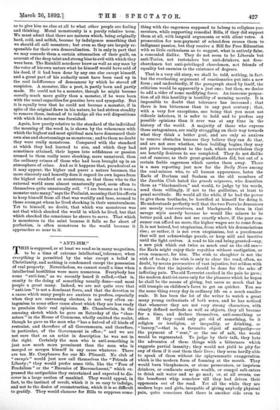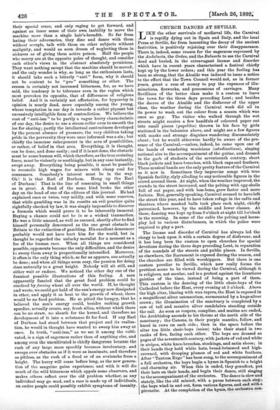"ANTI-ISM."
THIS is supposed, or at least we read so in many magazines, to be a time of extreme intellectual; tolerance, when everything is permitted by the wise except a belief in Christianity, and nothing is condemned except the possession of real property. Nevertheless, we cannot recall a time when intellectual hostilities were more numerous. Everybody has some "anti-ism," as we recently heard it called,‚ÄĒthat is, enmity to the doing of something usually done‚ÄĒand most people a great many. Indeed, we are not quite sure that " anti-ism " is not a dominant force, and that the devotion to a cause which many people are anxious to profess, especially when they are canvassing electors, is not very often an- tagonism to some other cause about which they are less ready to proclaim their real opinions. Mr. Chamberlain, in the amusing sketch which he gave on Saturday of the " char- acters " in the House of Commons, wholly omitted the zealot, though he gave us the man who "has a hatred of all kinds of restraint, and therefore of all Governments, and therefore, in particular, of the Government in office ; " and we are not sure that as an artist in description he was not in the right. Certainly the man who is anti-something is just now much more prominent than the man who is merged or merges himself in any cause whatever. There are ten Mr. Conybeares for one Mr. Plimsoll. No club of " enrages " would just now call themselves the "Friends of Liberty;" they would prefer some title, like the "Foes of Feudalism" or the "Enemies of Encroachment," which ex- pressed the antipathies they entertained and expected to dis- cover in a large section of mankind. They would appeal, in fact, to the instinct of revolt, which it is so easy to indulge, and not to the desire of reconstruction, which it is so difficult to gratify. They would clamour for Bills to suppress some-
thing with the eagerness supposed to belong to religions per- secutors, while supporting remedial Bills, if they did support them at all, with languid arguments or with silent votes. A prosecution for non-payment of school-fees rouses them to indignant passion, but they receive a Bill for Free Education with so little enthusiasm as to suggest, what is entirely false, a concealed dislike. They do not seem to be Liberals but anti-Tories, not teetotalers but anti-drinkers, not free- churchmen but anti-privileged churchmen, not friends of equality but enemies to the existence of degrees.
That is a very old story, we shall be told, nothing, in fact, but the everlasting argument of reactionaries put into a new form ; and undoubtedly, if the paragraph stood by itself, the criticism would be apparently a just one ; but then, we desire to add a rider of some modifying force. An immense propor- tion of all this hostility is hostility of seeming merely. It is impossible to doubt that tolerance has increased ; that there is less bitterness than in any past century ; that, with a very few exceptions, one being that you must not ridicule inferiors, it is safer to hold and to profess any possible opinions than it ever was at any time in the history of the world. A majority of those who express these antagonisms, are really struggling on their way towards what they think a better goal, and are only so anxious to remove obstacles because they believe they can do that, and are not sure whether, when building begins, they may not prove incompetent to the task, which nevertheless they are heartily desirous to see completed. They do not dislike out of rancour, as their great-grandfathers did, but out of a certain feeble eagerness which carries them away. There is a man reporting just now for the Daily News among the coal-miners who, to all human appearance, hates the Earls of Durham and Seaham as the old members of the Jacobin Club hated the grands seigneurs, who describes them as "blackmailers," and would, to judge by his words, send them willingly, if not to the guillotine, at least to penal servitude. He would all the while, if he had the power to give them toothache, be horrified at himself for doing it. He understands perfectly well that the two Peers he denounces are merely rent-receivers, and blackguards them in that savage style merely because he would like miners to be better paid, and does not see exactly where, if the poor con- sumer can afford no more, the higher wages are to come from. It is not hatred, but utopianism, from which his denunciations rise; or rather, it is not even utopianism, but a puzzlement that will not acknowledge puzzle, or keep still and inactive until the light arrives. A road to his end being granted‚ÄĒsay, a new pick which cut twice as much coal as the old one‚ÄĒ the Earls might enjoy their royalties without castigation, or even comment, for him. The wish to slaughter is not the wish of to-day ; the wish is only to clear the road, often, no doubt, by means provocative of vast injustice, but seldom with a desire that the injustice should be done for the sake of inflicting pain. The old Terrorist exulted in the pain he gave; the modern Anti-fat cares only for the pleasure which he hopes he shall be the means of giving, but cares so much that he will trample on children's faces to get on quicker. You see the same thing every day in ordinary life on a much smaller scale. It has been the lot of the writer to watch a great many young enthusiasts of both sexes, and he has noticed that whenever they are not very strong characters, with clearly defined methods as well as objects, they all become for a time, and declare themselves, anti-something or other. If they could only get rid of something, be it religion or irreligion, or inequality, or drinking, or " luxury,"‚ÄĒthat is, a favourite object of antipathy‚ÄĒor the payment of "rent," or the use of salt, the world would be regenerated. To judge by their talk, they hate the advocates of these things with a bitterness which suggests partial insanity; they would not yield to pity for any of them if it cost them their lives; they seem hardly able to speak of them without the epigrammatic exaggeration which is the modern form of foaming at the month. They would burn blasphemers, or stone persecutors, or imprison drinkers, or confiscate surplus wealth, or compel salt-eaters to drink salt water and so go mad; or, at all events, use the beneficent whip somehow till they had driven their opponents out of the road. Yet all the while they are modern boys and girls, incapable of giving anybody physical pain, quite conscious that there is another side even to their special craze, and only raging to get forward, and against an inner sense of their own inability to move the machine more than a single hair's-breadth. So far from hating their adversaries, they dine and dance with them without scruple, talk with them on other subjects without malignity, and would as soon dream of neglecting them in sickness as of giving them active poison. Half the people who marry are at the opposite poles of thought, and consider each other's views in the abstract absolutely pernicious. They want nothing except that the machine should be moved; and the only wonder is why, so long as the enthusiasm lasts, it should take such a bitterly "anti" form, why it should not be content to be " pro " something or other. The reason is certainly not increased bitterness, for, as we have said, the tendency is to tolerance even in the region which most provokes its opposite, that of differences of religious belief. And it is certainly not affectation, for hypocrisy in opinion is nearly dead, more especially among the young, whose temptation in our day is towards a rather piquant but excessively intelligible form of contradiction. We believe the root of " anti-ism " to be partly a vague hurry characteristic of our day, the desire to use a steam-roller even to smooth the ice for skating; partly the intellectual contrariness developed by the present absence of pressure, the very children taking pride in the perversity they were once informed was a sin ; but chiefly the immense enlargement in the area of possibilities, or rather, of belief in that area. Everything, it is thought, can be done, and done easily; and if it is not done, the obstacle must be some human will, which therefore, as the true resisting force, must be violently or soothingly, but in any case instantly, swept away. Everything being possible, it must be possible to reconcile high wages for miners with cheap coal for oonsumers. Somebody's interest must be in the way. Oh! it is that Earl of Durham. Hang up the Earl of Durham ! That is the line of reasoning in small things as in great. A flood of the same kind broke the other day on the head of one of the editors of this journal. He had explained once or twice, very mildly, and with some reserves, that while gambling was in its results an evil practice quite rightfully checked by law, it was simply impossible to discover -a formula which would prove it to be inherently immoral. Buying a chance could not be in se a wicked transaction. He was a little amazed, as well as amused, shortly after to find himself personally denounced as the one great obstacle in Britain to the extinction of gambling. His excellent denouncer probably would not have hurt him for the world, but in thought he regarded the unlucky moralist for a moment as a foe of the human race. When all things are considered possible, opponents become the only difficulties, and the desire to sweep them away is proportionally intensified. Moreover, it often is the only thing which, so far as appears, can actually be done; and when all things seem easy, the passion for doing rises naturally to a great height. Nobody will sit still, and either wait or endure. We noticed the other day one of the funniest possible illustrations of this feeling. A man apparently fancied that the great food problem could be resolved by forcing wheat all over the world. If, he thought and wrote, we could get hold of the sun's energy now dissipated in ether, and apply it as heat to the growth of wheat, there would be no food problem. He so pitied the hungry, that he believed the sun's energy could, besides making growth speedier, actually create, say, fresh silica, without which there can be no straw, no sheath for the kernel, and therefore no development of it into a substance fit for food. If any Earl of Durham had stood between that project and its realisa- tion, he would in thought have wanted to sweep him away at once. In truth, "anti-ism," as we see it among the culti- vated, is a sign of eagerness rather than of anything else, and among even the uncultivated is chiefly dangerous because the rush of any large mass speedily becomes involuntary, and sweeps over obstacles as if it were as inanimate, and therefore as pitiless, as the rush of a flood or of an avalanche from a height. The hurry will cease before long, as the new genera- tion of the sanguine gains experience, and with it will die much of the wild bitterness which appals some observers, and makes others reflect over the old problem whether, as any individual may go mad, and a race is made up of individuals, an entire people could possibly exhibit symptoms of insanity.



































 Previous page
Previous page